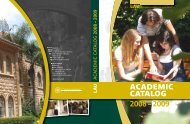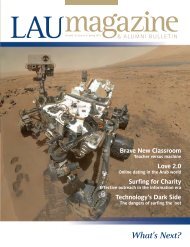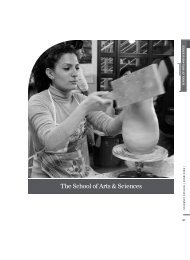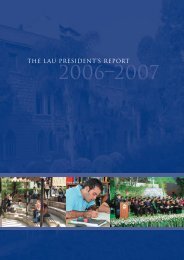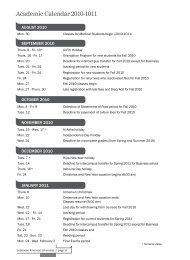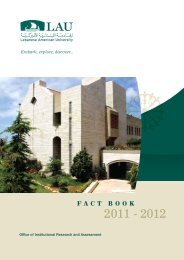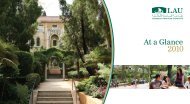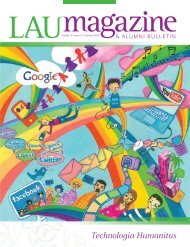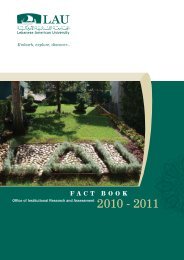academic-catalog2011.. - LAU Publications - Lebanese American ...
academic-catalog2011.. - LAU Publications - Lebanese American ...
academic-catalog2011.. - LAU Publications - Lebanese American ...
Create successful ePaper yourself
Turn your PDF publications into a flip-book with our unique Google optimized e-Paper software.
Department of Humanities<br />
CURRICULUM REQUIREMENTS<br />
Advanced training is offered in three areas of<br />
study:<br />
• Literature and other cultural productions.<br />
Students will achieve broad intercultural<br />
competence in genre, period and theme.<br />
• Theoretical frameworks. Students will<br />
explore a range of literary and cultural<br />
theories, and demonstrate significant<br />
mastery of at least one.<br />
• Research methods and written and<br />
oral expression. Students will work with<br />
experienced researchers in a variety of<br />
media and receive advanced training in<br />
written and oral communication.<br />
Graduate students in Comparative Literature<br />
must complete 30 credit hours in three areas:<br />
A. 18 credits of core courses:<br />
CLT801<br />
Methodologies of Comparative<br />
Literature<br />
3<br />
CLT803 Literary Theory I 3<br />
CLT804 Literary Theory II 3<br />
CLT820 Period 3<br />
CLT830 Themes 3<br />
CLT840 Genre 3<br />
B. 6 credits of coursework in one of the<br />
following:<br />
1. A national literature and culture.<br />
2. A non-literature cognate (graduate-level<br />
courses in a field of interest such as<br />
anthropology, film, history, music, philosophy,<br />
psychology, etc…).<br />
C. A written Preliminary Exam, and a 6-credit<br />
Master’s Thesis, CLT 899<br />
The Preliminary Exam in Comparative<br />
Literature tests the student’s capacity to deal<br />
with specific topics rather than address very<br />
general areas. A reading list that consists<br />
of 5-10 texts prepared by the examining<br />
committee in consultation with the student<br />
takes into consideration the field/s of<br />
research related to the thesis topic for each<br />
student. The Preliminary Exam takes the<br />
duration of three hours. Each member of the<br />
Examining Committee will receive a copy of the<br />
answering sheets, and will correct the exam<br />
independently. The result, which is either a<br />
Pass or Fail, is communicated to the Director of<br />
the Program. If the three examiners give a Pass<br />
to the examinee, the student will be notified<br />
about the result. If one of the examiners fails<br />
the student, the Director will call for a meeting<br />
where the examiners decided on whether the<br />
student should pass or fail. Students who fail<br />
are given a second chance within a month from<br />
the date of the first exam. Those who fail in the<br />
second comprehensive preliminary exam will<br />
be suspended from the Program. The students<br />
are expected to pass the Preliminary Exam<br />
prior to commence working on their thesis.<br />
COURSE DESCRIPTIONS<br />
ARABIC STUDIES<br />
ARA101 Essay Reading and writing I<br />
[3-0, 3 cr.]<br />
This course concentrates on essay reading<br />
and writing. Through selected readings that<br />
represent different types of essays, students<br />
will receive training on literary analysis and<br />
essay writing skills. This course also includes<br />
a review of essential grammatical rules of the<br />
Arabic language.<br />
ARA102 Essay Reading and writing II<br />
[3-0, 3 cr.]<br />
This course, being complementary to ARA 101,<br />
focuses on the study of the development of the<br />
“Essay” as a literary genre. It focuses on articles<br />
on literary criticism, newspaper articles, and<br />
articles that deal with autobiography, memoirs<br />
and travel. It also tackles the Western influence<br />
on the evolution of essay writing in Arabic. In<br />
this course, students receive training on skills<br />
of writing articles.<br />
ARA201 Appreciation of Arabic Literature<br />
[3-0, 3 cr.]<br />
This course is divided into two parts. First, the<br />
theoretical part, which deals with the essential<br />
characteristics of literature, as well as literary<br />
themes, schools, and genres, and second, the<br />
practical part, which includes the intensive<br />
analysis of selected excerpts illustrating<br />
important literary forms, and trends.<br />
ARA301 Advanced Arabic Grammar [3-0, 3 cr.]<br />
This course covers the fundamental principles<br />
of the Arabic language, and deals with the<br />
grammatical and syntactic mistakes commonly<br />
made by students in writing. It includes written<br />
exercises.<br />
ARA302 Arabic Rhetoric [3-0, 3 cr.]<br />
This course includes the main forms of rhetoric,<br />
and their application in ancient, and modern,<br />
poetry and prose. It includes written exercises<br />
in rhetorical and literary analysis.<br />
<strong>Lebanese</strong> <strong>American</strong> University | page 148



